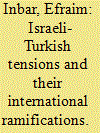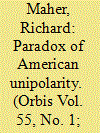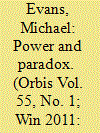| Srl | Item |
| 1 |
ID:
101212


|
|
|
|
|
| Publication |
2010.
|
| Summary/Abstract |
While Brazil has increased its interdependence within the global system, the "geometry" of this interdependence has changed; that is, it has become less vertical (in relation to the United States), more "diagonal" (in relation to Europe) and more horizontal (in relation to other developing countries). Moreover, this article argues that the vulnerability dimension of Brazilian interdependence has been assuaged and concludes with some putative consequences of this fading interdependence and a policy prescription on what the United States could do if it wants to reverse this trend.
|
|
|
|
|
|
|
|
|
|
|
|
|
|
|
|
| 2 |
ID:
101210


|
|
|
|
|
| Publication |
2011.
|
| Summary/Abstract |
This article examines the assumptions that lead China alarmists to dismiss America's ability to impose a distant blockade as an inadequate counter to Chinese A2/AD systems. It argues that distant blockade is indeed a viable, lower cost strategy that capitalizes on America's strengths and China's weaknesses.
|
|
|
|
|
|
|
|
|
|
|
|
|
|
|
|
| 3 |
ID:
101206


|
|
|
|
|
| Publication |
2011.
|
| Summary/Abstract |
The United States has never followed only one grand strategy at a time. In this article, I develop the concept of "hybrid" grand strategies-strategies that vary by time and place, and combine the advantages (or disadvantages) of pure strategic archetypes such as containment, integration, regime change, bargaining, or non-intervention. I argue that hybrid strategies have been ubiquitous in American history, varying more by emphasis and degree than by absolute contrast. Moreover, U.S. hybrid strategies have often succeeded in accomplishing their major goals.
|
|
|
|
|
|
|
|
|
|
|
|
|
|
|
|
| 4 |
ID:
101211


|
|
|
|
|
| Publication |
2010.
|
| Summary/Abstract |
The deterioration of relations between Israel and Turkey, culminating in the "Gaza flotilla" affair of June 2010, are part of a reorientation in the Turkish foreign policy over the past several years: a move away from the West and toward Muslim states and non-state groups, including such radical actors as Iran, Hamas and Hizballah. This article reviews the rationale for the Israeli-Turkish strategic partnership in the 1990s and the early years of this century. It then documents deviations in Turkish foreign policy from Western patterns. Next it examines how changes in Turkey's twenty-first century strategic environment, as well as in the domestic arena, led to a reorientation of Turkish foreign policy and to current tensions in bilateral relations. And finally, it assesses the impact of the changes in Turkish foreign policy on the Greater Middle East and global politics.
|
|
|
|
|
|
|
|
|
|
|
|
|
|
|
|
| 5 |
ID:
101205


|
|
|
|
|
| Publication |
2010.
|
| Summary/Abstract |
This article argues that U.S. leaders navigated their way through World War II challenges in several important ways. These included: sustaining a functional civil-military relationship; mobilizing inside a democratic, capitalist paradigm; leveraging the moral high ground ceded to them by their enemies; cultivating their ongoing relationship with the British, and embracing a kind of adaptability and resiliency that facilitated their ability to learn from mistakes and take advantage of their enemies' mistakes.
|
|
|
|
|
|
|
|
|
|
|
|
|
|
|
|
| 6 |
ID:
101213


|
|
|
|
|
| Publication |
2010.
|
| Summary/Abstract |
This article will reexamine basic assumptions about the geopolitics and character of the United States-Mexico border, take a closer look at current events that have affected the drug war and, finally, discuss possible policy responses beyond those routinely voiced in the public domain.
|
|
|
|
|
|
|
|
|
|
|
|
|
|
|
|
| 7 |
ID:
101207


|
|
|
|
|
| Publication |
2010.
|
| Summary/Abstract |
The decline in the United States' relative position is in part a consequence of the burdens and susceptibilities produced by unipolarity. Contrary to the conventional wisdom, the U.S. position both internationally and domestically may actually be strengthened once this period of unipolarity has passed.
|
|
|
|
|
|
|
|
|
|
|
|
|
|
|
|
| 8 |
ID:
101209


|
|
|
|
|
| Publication |
2011.
|
| Summary/Abstract |
The pattern of Asian geopolitics can be examined by employing three analytical perspectives. The first employs East Asia and the vigorous debate over the meaning of the rise of China as an intellectual prism to observe the currents of geopolitical continuity and change that are currently abroad in the Asian region. The second explores the extent to which the interacting forces of geopolitics and military modernization foster the rise of new force projection capabilities that may affect the strategic environment in Asia-particularly in East Asia. Here, the focus is mainly on the arsenals of the three indigenous Asian giants, China, Japan and India, all of whom have developed, or are in the process of developing, significant air and maritime assets whose operations have the potential to intersect in East and South East Asia. Russia is not as much a presence because it no longer possesses its powerful Soviet-era Pacific Fleet and has, in essential respects, retreated to its traditional role as a Eurasian land power.1 The third examines the future of Sino-American relations in Asia in the context of the debate over China's ascent and U. S. decline-a discussion that has intensified since the implosion of the U.S. financial system in 2008 and the onset of the worst global recession since the 1930s.
|
|
|
|
|
|
|
|
|
|
|
|
|
|
|
|
| 9 |
ID:
101208


|
|
|
|
|
| Publication |
2010.
|
| Summary/Abstract |
This article examines "strategic latency," a condition in which technologies that could provide military (or economic) advantage remain untapped. As difficult as it is to explain why certain ideas and technologies flourish and find rapid acceptance, it is equally hard to understand why some good ideas languish, only to be rediscovered and exploited under other circumstances. Why is latent capacity so often dormant? What are the indicators that latent capacity is on the verge of being weaponized?
|
|
|
|
|
|
|
|
|
|
|
|
|
|
|
|